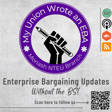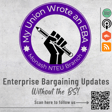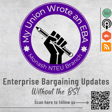
Episode 23: 2023, the year that was.
In this episode, Kate & Tony bring together one last episode for the year. They talk to Branch President Ben Eltham about where we are at with bargaining now that it has finished up for the year, as well as looking back over the year and what the Branch has accomplished, and looking forward towards what might be in store next year with our new Vice Chancellor.
We then pass the mic over to Adam who has a chat with Marjorie Jerard about Sandra Cockfield, in whose name the recently awarded Activist of the Year award is named.
If you have questions you'd like answered, or any topics you would like to hear covered on the podcast, drop us an email at myunionwroteaneba@gmail.com
You can also stay up to date with everything happening with bargaining at our new bargaining website, and with the branch on Facebook and Twitter. All of which can be found here - https://linktr.ee/myunionwroteaneba


